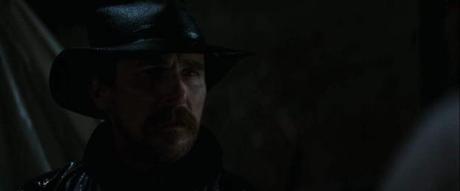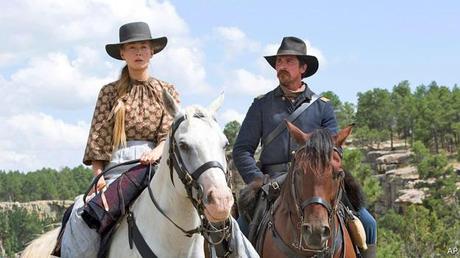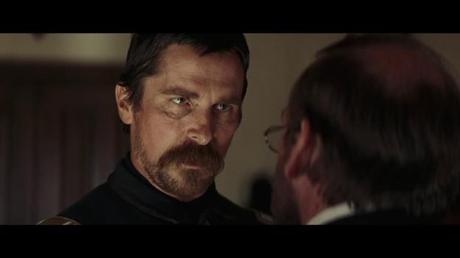Halfway through Scott Cooper's new western Hostiles, a bushy-bearded, half-naked, melancholic U.S. Cavalry officer stumbles through the pouring rain in a haze, nonchalantly pulls out what appears to be a revolver, and makes his way to a teepee housing an aging Native American chief (Wes Studi). Christian Bale's Captain Joseph Blocker watches all of this with a noted sense of alarm, as uncertain as we are as to where the movie is going with this. We already know, by this point, that Blocker and his long-time Sergeant, the bushy-bearded fella, famously massacred scores of Native Americans, referring to those times as "the good old days." That they, the people who seem to hate the Native Americans the most, end up assigned the task of escorting a war chief to his homeland seems like the definition of poor planning or simply formulaic screenwriting. Either way, we're not sure if Blocker's war-weary Sergeant intends to harm the chief or will instead offer up his own life as punishment for his sins.
He does neither. Instead, he solemnly apologizes on behalf of all white people for what was done to the Native Americans and begs the chief to accept his offering of tobacco as a symbol of his contrition. The chief, light, and shadow bouncing beautifully off of his weathered face, nods quietly.
It's the perfect encapsulation of the whole entire movie: lots of build-up, gorgeous cinematography, contrite white people bluntly stating their emotions and announcing their regrets, silent Native Americans nodding along. The only thing it's missing is an outburst of extreme violence. Otherwise, this scene - this is Hostiles ' jam.

If you've seen any of Cooper's prior films - Black Mass, Out of the Furnace, or Crazy Heart - it shouldn't be surprising. As a director-writer, he's never in a hurry to get where he's going nor does he have any use for subtlety. He makes self-serious, painfully slow, often brutal movies about wounded masculinity and has found in Bale the perfect vehicle for, as one reviewer put it, the "grumbly macho cry" (he does it at least four times throughout Hostiles' 131-minute running time). What makes this limited formula so frustrating is just how talented a filmmaker Cooper can be in small bursts, such as a wonderfully tense nighttime ambush sequence in Hostiles. In totality, though, his movies tend to reward only those who want an extra helping of deliberation and bluntness in their Serious American Drama.
The plot, adapted from deceased screenwriter Donald E. Stewart's 1980 manuscript, plays like a mixture of The Searchers (1956), Unforgiven (1992), and The Last Samurai (2003). Characters who hate Native Americans learn to love or at least forgive them, and a central character on his way out of a violent lifestyle is forced to atone for his sins and come to terms with his repressed guilt.
It's 1892, over fifteen years removed from Little Bighorn and Custer's Last Stand. In New Mexico, Captain Blocker and his men are tasked with keeping the peace at the prison-like Fort Berringer, tracking down any Native Americans who escape from their cells. In general, the hostilities in the American-Indian War has cooled down. America won, but now it's starting to feel bad about it. So, due to pressure from the East Coast and President Harrison one of the longest-serving prisoners at Fort Berringer, a cancer-stricken war chief, is pardoned and ordered back home along with his family to Montana. Since he's the only one who knows that territory, Blocker is assigned the job despite his rather loud protests.
Shortly after embarking on their journey, Blocker's posse picks up a suicidal woman, Rosalie (Rosamund Pike), who just lost her husband, two daughters, and baby to a Comanche raid. In fact, the very opening scene of the film depicts Rosalie running away from her attackers, unaware the baby she's carrying has been shot dead.

Thus, the narrative endpoints seem apparent from the get-go: this is to be a Colonialist story about white guilt and forgiveness. Forced to travel with Native Americans, Blocker will learn to accept how much he's been lying to himself about his history of violence simply being a case of "following orders." Rosalie will have to find a reason to keep living and come to know and accept that not all Native Americans are like the ones who killed her family.
What becomes or does not become of these dual arcs isn't entirely convincing, and at no point are the Native American characters ever afforded a true voice in the narrative. This isn't a movie about them; it's about the psychological aftermath of war and rediscovering a moral equilibrium when the fighting finally ends. For the most part, Hostiles depicts this via a series of quiet conversation in which characters literalize their emotions. These scenes are pieced together by breathtaking panoramic shots of the group traveling from one spot to the next, with Santa Fe, New Mexico doubling for Colorado and Montana as well as Fort Berringer, New Mexico. The sluggish pace creates a palpable sense of dread which elevates the infrequent action scenes into crushing, but welcomed respites.
By the end, Hostiles seems to betray its own characters and message, ultimately wasting an incredibly committed Christian Bale performance. In different hands, this movie would be 15 minutes shorter and crackle with a bit more of the back-and-forth between hero and perceived villain of something like the 3:10 to Yuma remake. In Cooper's hands, it feels more like White Guilt: The Western.
THE BOTTOM LINEGorgeous, well-acted, impressively brutal, but far too long and in its worst moments it plays dangerously close to being an unintentional parody of a self-serious historical drama.
CRITICAL CONSENSUS RIGHT NOW RANDOM PARTING THOUGHT
- Lethal Weapon moment: Faster than you can say "three days from retirement," a ready-to-retire Blocker is ordered by his superior to escort the chief home, and if he refuses he'll be court-martialled and thus denied his pension.

